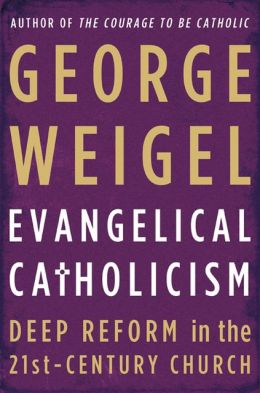I’m continuing the discussion on this great book by George Weigel. Previous posts here, here, and here.
The sixth trait Weigel discusses is the Bible and how it is to be studied and used in our everyday life. “Evangelical Catholicism is a biblically centered form of Catholic life that reads the Bible as the Word of God for the salvation of souls.” That opening sentence pretty much sums up the point.
Reading the Bible is an intellectual exercise, focused on “What does this passage mean” and nothing more. It tells us that the Word of God is alive and has meaning for us now. Yes, we should understand it intellectually, but then we must apply it to our lives. It is not a book to read and dismiss as “metaphor” or “myth,” but a book to guide us into a deeper understanding of our salvation history and how that salvation impacts our life now.
Trait seven reminds us that the Church is an organized hierarchy containing many respected vocations. Each of us—priests, bishops, consecrated religious, deacons and lay persons—have a role to play in the Church.
Evangelical Catholicism wants to see a return to priests and bishops serving as “teacher, preacher, and catechist” and not so focused on administration. Selfishly, I’d also like to see more lay people or deacons as parish administrators. And we, lay people, are called, as St. John Paul II reminds us, to evangelize the world in which we live. Evangelical Catholics know that they have been many gifts and are willing and able to use them for the good of the Church.
Weigel next says that Evangelical Catholicism is both “culture-forming and counter-cultural.” We are called to form ourselves into people whose belief in Christ makes us different than those who do not believe or simply pay lip service.
Catholicism is not something to do but something to be; as such it informs how we live. But that very thing that forms us also puts us in tension with the modern world. Our belief system which values life, service to others, and truth is looked upon oddly (to say the least) by a world in which it seems everything is relative.
This closing quote from trait eight sums it up,
“And if the West is to recover from the crisis of civilized morale in which is has been immolating itself in the last decades of the twentieth century and the first decades of the twenty-first, it is Christ, that Evangelical Catholicism, who will help humanize the earthly city through the agency of the City of God, present in an anticipatory way in the counter-culture that is the Church.”
Those look like marching orders to me. What do you think?
Copyright 2014, Deanna Bartalini
Leave a Reply
You must be logged in to post a comment.





